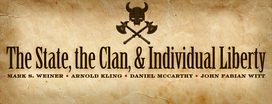Thanks to Daniel McCarthy for another stimulating response to my argument, and for broadening still further the scholarly frame of reference in which my work can be read.
Let me say from the start that I agree with him without hesitation when he writes: “The danger Weiner perceives is not the only one that has to be borne in mind as we think about the interplay of clans, groups, individuals, and states. A smart approach will avoid all of these dangers, not rush into the arms of one in the hopes of escaping another.” I’m especially sympathetic with his concern about an international scenario “in which the liberal state gradually [would become] a backwater in a world defined by more powerful non-individualist states.” For this reason, I think it’s essential for citizens in more fully realized liberal societies to make common cause with liberal reformers abroad. Liberals should support democratic reformers seeking to transform not only societies pervaded by clannism (a subject I take up in my book), but also overbearing states dedicated to collectivism or authoritarianism (a subject that I don’t examine).
In each case, what’s at stake is responsive, democratic government dedicated to liberal ideals. To build, preserve, and secure liberal democratic government, at home and abroad, as the signature middle space of modernity, ought to be the essential grand strategy of people dedicated to principles of individual freedom.
Just as liberals ought to be on guard against the deterioration of government institutions (the central concern of my book), and just as we should ensure that those institutions resist being captured by one interest group or another and so remain liberal (contra Argentina), so we also ought to embrace the institutions of civil society—mine is not a statist position. As McCarthy notes, one of those civil society institutions is the family.
There are many different types of families consistent with liberal society and politics. But one of the functions of the liberal state is to supplant those socio-legal institutions predicated on extended families—ascriptive, hierarchical, status-based—as constitutive units of common life. Thus while McCarthy surely is correct when, citing Schumpeter, he argues that the family creates an “economic impetus” by establishing a multi-generational time horizon for work, he surely also would support the common law rule against perpetuities and other doctrines that free up land and goods from the dead hand of dynastic tradition and power. In my view, modern government institutions simply extend these liberalizing ends of common law, understood now not only in the negative terms of liberty but in the positive terms of individual autonomy.
Would I view Toqueville’s scenario as a dystopia? Yes, in a moral rather than a political sense (though I suspect not as strongly as McCarthy would), and as a challenge that would require the response of social institutions. But what type of social institutions? In embracing the historical movement from the clan as an ascriptive, collective institution to the club as a liberal, voluntaristic one, I don’t mean to suggest that club-like associations ought necessarily to be psychologically or culturally thin. In the conclusion to a previous book, I’ve wondered about the ability of liberalism to survive without vibrant religious attachments. But in a liberal society, the ability of persons to secure a range of critical goods ought not to depend on whether they belong to such institutions. This would degrade the public ends of liberalism by making those institutions similar to traditional clans.
As for McCarthy’s point “that groups that are neither purely voluntary clubs nor purely blood-based clans are most often the drivers of civil society and of struggles for civil rights,” I would say, first, that what he describes are interest groups. Although the Chartists fought for the benefit of a class, the movement was both small and entirely voluntary. It was composed of clubs (I focus on the Chartists because they are especially dear for reasons of spousal pride). Moreover, in my view, the political goals of groups based on immutable characteristics can be described as “liberal” only when they are directed toward ending the use of immutable characteristics as a basis for the distribution of public goods, except under very limited circumstances. As I wrote in reply to McCarthy’s first response, groups mediate liberal politics, but they are not its end.
One final note on voluntary associations. In my book, I argue that civil society institutions are important in psychological and social terms, and I’m grateful to McCarthy for underscoring what I would have gladly added to the text in retrospect, if only in a note, namely that they are also important for their ability to offset state power. This omission should be read simply as pointing toward the balance of my concerns.
McCarthy’s argument raises for me a question that I think is critical not only to our domestic politics but also to foreign policy, a question that was raised insistently, for instance, by the war in Afghanistan, but which applies here at home, too. The question is: how can liberal ideals be advanced by aligning traditional, local, customary, informal institutions of governance with central, bureaucratic, liberal government institutions? What are the different ways—in practical terms—of connecting bottom to top, periphery to center, in the interests of liberal democratic government? And how can the various forms which this configuration may take help us to better understand the very definition of the liberal rule of law? I suspect that answering that question would clarify which differences between participants in this forum, including those readers following along, are of a fundamental philosophical kind and which represent policy choices along a continuum of liberal options.

